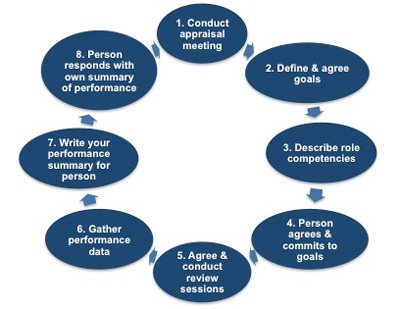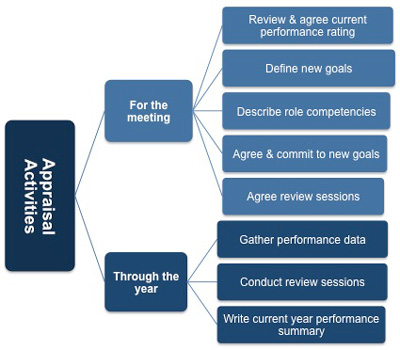Evaluating Performance Appraisal
As a manager you play a pivotal role in the performance management system. Your responsibilities in this area include collecting and evaluating performance data, conducting the appraisal meetings, and completing the final appraisal reports.
Most appraisals are conducted over a 12-month period as it matches the annual cycle of other key business functions, such as budgeting, pay reviews, and performance bonuses.
 |
The stages of the appraisal process are:
- Conduct the appraisal meeting.
- Define and agree goals.
- Describe role competencies.
- Agree goals with the individual, and gain his or her commitment to them.
- Agree and conduct regular review sessions.
- Gather a wide range of performance data throughout the whole cycle.
- Write your performance summary for the individual.
- Individual responds to Stage 7 with their own performance summary.
For practical purposes we will use the actual appraisal meeting as the start of this cycle. This is because as a new manager one of your first actions should be to meet with each team member and understand what they see their role to be, what goals they are working towards, and how they view their contribution to the organization.
The first five stages of this process are discussed in the 'Appraisal Meeting' eBook, which can be downloaded from this website. The last three stages represent activities that need to be conducted outside of the actual meeting, and involve recording and collating the relevant performance data.
You need to allocate frequent slots within your monthly work schedule where you collate and record performance data. An effective way to collect the required data is to ask your team to structure their monthly progress reports in a way that maps to their personal goals.
You will also want them to record details of any significant incidents that have occurred. You should also create your own notes of such events, both positive and negative.
 |
In addition, you need to solicit information from both internal and external 'customers' of your team, in order to gather your own data about your team members' performance and attitude.
You may also be interested in:
Appraisal Data Collection | Evaluating Competencies | Performance Appraisal Rating Bias | Performance Appraisal Rating Scales | Performance Appraisal Reviews | Writing an Annual Performance Summary.



